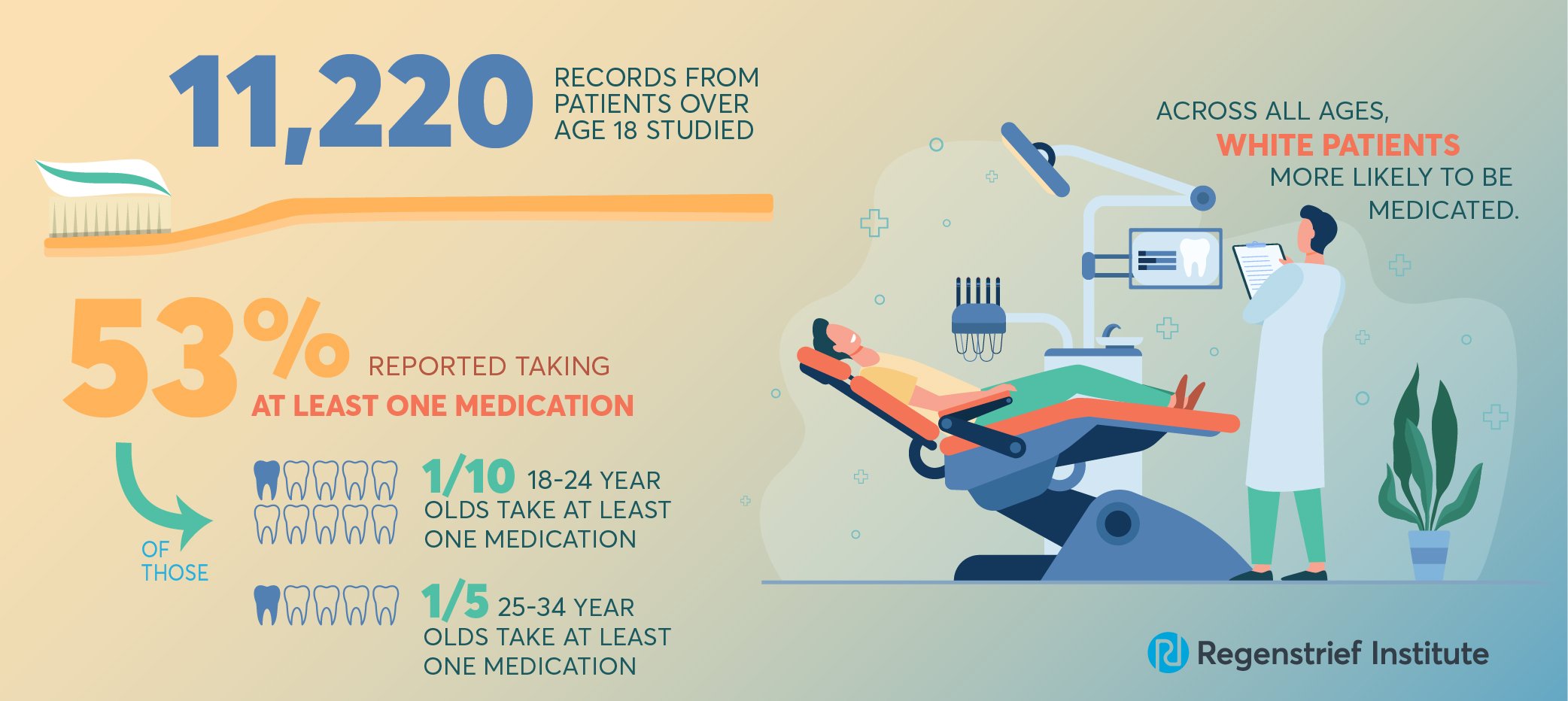Study shows dentists need to be aware of medication history even in younger patients
A new study demonstrates that many younger adult dental patients are taking medications and highlights the importance of dental providers reviewing medication histories regardless of age.
The study from Regenstrief Institute and the Indiana University School of Dentistry looked at dental records from 11,220 dental patients over the age of 18. The results showed:
- 53 percent of all patients reported taking at least one medication
- 12 percent of those age 18-24 were taking at least one medication
- 20 percent of those age 25-34 were taking at least one medication
“The number of younger adults on medication really surprised us,” said senior author Thankam Thyvalikakath, DMD, PhD, director of the Regenstrief and IU School of Dentistry Dental Informatics Program. “Often dentists will assume individuals this age aren’t on medications, but these results underscore the importance of paying attention to medical histories of all patients, because medications can play a significant role in oral health.”
Younger adults were most likely to be taking antidepressants, which can cause dry mouth, and opioids, which carry the risk of addiction.
“We need to be aware of these possibilities, because dry mouth increases risk for tooth decay and tooth loss, and dental professionals should be proactive with preventive measures,” said Dr. Thyvalikakath. “In the same way, if someone is taking an opioid, we as dentists need to make sure we are not overprescribing these medications to that patient and possibly contributing to dependence or substance use disorder.”
The study showed that older patients were more likely to be taking medications to treat chronic conditions like high cholesterol, hypertension and diabetes. Across all ages, white patients were more likely to be on a medication.
In the future, Dr. Thyvalikakath hopes to develop and test an intervention to alert dental care providers about medicines and medical history because a more complete picture of a person’s health can lead to better care and prevention.
“Differences in medication usage of dental 2 patients by age, gender, race/ethnicity and insurance status” was published in Technology and Health Care, the official journal of the European Society for Engineering and Medicine online ahead of print. This project was made possible by Dr. Thyvalikakath’s start-up funds through the Indiana University School of Dentistry.
In addition to Dr. Thyvalikakath, authors on the paper are Dr. Zasim Siddiqui, BDS, M.S.; Yue Wang, M.S.; and Jay Patel, BDS, PhD, M.S., PhD; all of the IU School of Dentistry.
About Regenstrief Institute
Founded in 1969 in Indianapolis, the Regenstrief Institute is a local, national and global leader dedicated to a world where better information empowers people to end disease and realize true health. A key research partner to Indiana University, Regenstrief and its research scientists are responsible for a growing number of major healthcare innovations and studies. Examples range from the development of global health information technology standards that enable the use and interoperability of electronic health records to improving patient-physician communications, to creating models of care that inform practice and improve the lives of patients around the globe.
Sam Regenstrief, a nationally successful entrepreneur from Connersville, Indiana, founded the institute with the goal of making healthcare more efficient and accessible for everyone. His vision continues to guide the institute’s research mission.
About Indiana University School of Dentistry
The only dental school in the Hoosier state, Indiana University School of Dentistry (IUSD) offers an extraordinary learning environment in which teaching, research and community service come together in the best way possible for the preparation of tomorrow’s dental professionals. About 80 percent of the dentists practicing in the state of Indiana are alumni of the school.
Founded in 1879 in Indianapolis, IUSD is located on the health sciences campus of IUPUI, one of the outstanding urban universities in the United States with a recognized commitment to community engagement. IUSD capitalizes on the campus’s central location in the state and its position in the research corridor that links IUPUI, Purdue University West Lafayette, and Indiana University Bloomington. IUSD faculty conduct world-class interdisciplinary research in collaboration with the other IU health science schools and the Purdue Schools of Engineering and Technology and Science.
About Thankam Thyvalikakath, DMD, PhD
In addition to her role as a Regenstrief research scientist and director of the Regenstrief Institute and IU School of Dentistry Dental Informatics Program, Thankam Thyvalikakath, DMD, PhD, is the director of dental informatics, an associate professor at IU School of Dentistry and an adjunct associate professor in the IUPUI School of Informatics and Computing.










